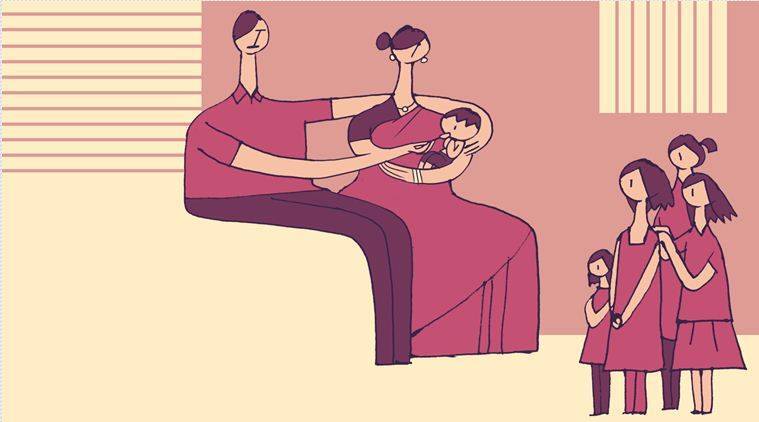Mansour Omari – LLM in Transitional Justice
The first violent trauma that a woman experiences in her life is the preference for a male child over a female, which is widespread in the Syrian society and other societies.
Women are subject to male oppression from birth and grow up hearing conversations and stories of preferring a male child over a female. From the father’s “disappointment” with the female newborn, to the father and mother who kept giving birth to one child after another until they finally got a male child and then stopped having children. Or that father who married another because his ex-wife “only gives birth to females”, that is, if he did not divorce her, and other stories and manifestations related to the preference for a male child over a female.
This preference was not, in part, a result of the premeditated intention to discriminate against women, but rather the result of a mixture of societal male oppression, reflected in government systems, and reinforced by laws. Males are the protectors of “honor” and females are the constant threat to honor, according to a societal concept that is reinforced by national laws that are complicit with it and which reduce the punishment of what it describes as “honor crime”, and societal custom describes it as “washing shame.”
Several factors also contribute to this discrimination, including socio-economic factors, and the laws’ strengthening of preferences for males over females. From a socio-economic perspective, parents in prefer a newborn male over a female for several reasons, including the male’s ability to work and support for the family breadwinner. Although women can also work, but in a misogynist society that generally rejects women’s work, the male becomes the most appropriate economic option.
Popular proverbs play an important role in the controversy of male child preference and are an indication of this societal culture, such as “girls’ burden continues to death”. In addition to the prevailing thought that the male is the one who stays with his parents at the end and assists them when they grow up. He is the one who will bear the name and offspring of his father, while the female will go to a stranger!
Then in childhood, the parents’ interest in the male child appears at the expense of the female. The father takes his male child with him outside the house, takes pictures with him, and is proud of him, and all this while the female child stays at home, sees this preferential treatment, and get used to it as a second-class person. This initial idea grows with the female and negatively affects her self-confidence and self-evaluation in society, to become an acceptable social culture not only for men but also for women.
It is not necessary for a woman to be a defender of women’s rights, or for a male to be hostile to women’s rights. There are many women who prefer the male over the female and exercise a misogynist role in society, and support “honor crimes”, for example. The sex of a person may not play a role as important as one’s understanding and awareness of this harmful culture to society as a whole, not just to women.
This discriminatory culture is reflected in all aspects of life in society. For example, in a society trying to move from dictatorship, or from war to stability, this discriminatory phenomenon overwhelms the tools of political representation, transition, or change.
Let’s take for example, the National Coalition of Syrian Revolution and Opposition Forces, which was founded and supported by the international community, as a legitimate representative of the Syrian people. It includes only 8 women out of 92 members, with a percentage of 8.6 percent. Herein lies the responsibility of the supporters of this entity to correct its representative status and end this blatant discrimination against women, especially as it is one of the lowest rates of women’s political representation in the world. For example, in 2019 the percentage of women’s representation in the Saudi parliament was 19.9%, Afghanistan: 23.6%, and Somalia: 24.4%. This low representation of women in the largest Syrian opposition political entity is an indicator of the extent of the culture of discrimination against women, and a dangerous sign to the future of their representation in political transitions or transitional justice processes. When the essential role of women in transitional justice is dropped, the process becomes masculine transitional justice. In addition, women should not only be present in transitions and societal change as the mother of a male victim, the wife of a male victim, or the daughter of a male victim, but also as a woman victim.
The media is a major platform for the exchange of ideas and promotion of negative or positive thoughts. This highlights the role of the media and its importance in enlightening people, spreading awareness about women’s rights and protection, and correcting negative ideas and attitudes towards women. But Syrian media is another male field as well, where male journalists and media workers have the largest percentage by far. This difference weakens the women’s voice and focuses the areas of concern from the perspective of a male journalist. Nevertheless, there are important experiences to make room for women journalists, such as the “Maris” program at the Enab Baladi Foundation, which is supported by the Canadian government. This program opens the way for women journalists of the future, providing them with experience and practical training. There are also female journalists who have been subjected to various kinds of oppression and have continued their work, to stand out as important examples of women’s resistance and continuing to work.
In addition to the media, Syrian civil society institutions, and whatever their specialization, they must allow women to take their place from the cadres to the leadership.


